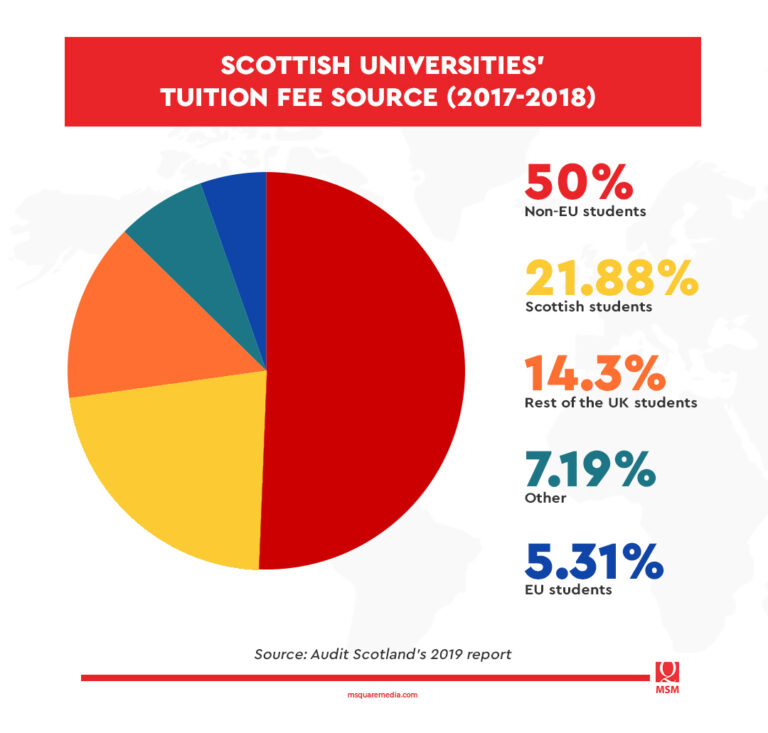The Parliament of the United Kingdom (UK) published a document in 2021 that gathered numerous points from different sources on the current financial state of universities in Scotland.
Key Takeaways
- In 2018-2019, Scotland spent £272 per head in its public higher education sector.
- Tuition fees in Scotland are the largest source of university income, accounting for 32 percent of the total funding (approximately £1.21b through 2018). Scottish Funding Council (SFC) grants made up the second highest income source at 30 percent.”
- In 2020, the operating deficit of Scotland universities was just around £50 million—thanks to international student enrollment.
- In 2016, international students contributed a net impact of £1.94 billion to Scotland.
Dubbed “Finances of Scottish universities,” the document enumerated important facts and figures that illustrate how universities in Scotland operate financially and how the pandemic has affected their income.
In 2018-2019, Scotland spent £272 per head in its public higher education sector. This amount ranks highest in the UK, with some regions only averaging about £40 per head.
For context, the UK is behind Germany, France, and Norway on GDP spending for tertiary education, said Mary Senior of the University and College Union Scotland, in her appearance before the House of Commons on Oct. 21, 2020. On that note, government leaders in Scotland support free tuition for Scottish and EU students.
Scotland is the only country in the UK that offers free university tuition for its domestic students (Students from European Union countries were accommodated as well until a policy change in 2020 following the Brexit vote).

According to the research briefings by the Scottish Parliament, Scottish universities have six main income sources: (1) tuition fees; (2) funding grants; (3) research grants; (4) investment income; (5) donations and endowments; and (6) others (including commercial). A 2019 report by Audit Scotland confirms this, as it states that tuition fees in Scotland “were the single largest source of university income.”
The report also found out that more than half of the tuition fees were from international students. The Scottish Parliament has identified that 57 percent tuition fee income received by Scottish universities was derived from non-UK students in 2018–2019. If including EU students—this was before Brexit—the total percentage would be 63 percent. The remaining 37 percent were contributed by domestic students and from the rest of the UK.

Scotland, international students, and the COVID effect
At the height of the pandemic since its official declaration in March 2020, universities in Scotland immediately experienced a financial blow as they had to refund international students leaving university-owned accommodation. Earlier forecasts pegged budget deficits in Scotland’s higher education sector at around £450–500 million, however, to the relief of the sector, the operating deficit was just around £50 million—thanks to international students.
According to an article by The Times, “fee-paying international students” handed “a lifeline to Scottish universities.” The British daily national newspaper based in London wrote: “The sector was braced for a loss of half a billion pounds as a result of the coronavirus preventing students from China coming to Scotland.”
HESA (Higher Education Statistics Agency) in the UK revealed in a 2018 report the top 10 non-European Union (EU) source countries of international students

Because of the COVID-19 pandemic, issues surrounding higher education funding in Scotland have come to light. Groups like the Scottish Funding Council (SFC) have investigated and identified some of the factors that affect Scottish universities financially. These include, but are not limited to, the fall of local and global stock markets, and the additional expenses related to the improvement of an institution’s education technology framework. However, it is glaring that Scottish universities rely heavily on non-EU enrollments to sustain their operations.
Scotland’s reliance on international students
The enrollment of international students is an important factor for Scottish universities. As of 2022, there were a total of 68,180 international students enrolled in higher education in Scotland. This comprised 47,630 non-EU students and 20,550 EU students.
There is greater opportunity for more international students in Scotland, as its public universities can tap into the contributions of international students as a source of income in order to remain financially sustainable, reported the Scottish Funding Council.
According to the RSE Young Academy of Scotland, the country has the highest proportion of international students relative to other OECD (Organisation for Economic Co-operation and Development) countries. In 2017, international students contributed a net impact of £1.94 billion to Scotland.
In an appearance before the Scottish Affairs Committee, Richard Lochhead, Scotland’s Minister for Further Education, Higher Education and Science, said: ”We now have to look at whether [Scottish universities] are sustainable going forward, and whether we are overdependent on international students. I do not think that means being less attractive to international students or having fewer international students coming to Scotland, but I think there is a challenge in terms of the overall financial model.”
Independent institutional initiatives
While the big picture shows how Scottish lawmakers are currently looking at the possibility of drafting a revised tuition policy—one that ensures the sustainability of their country’s higher education sector and its thrusts on internationalization—a closer look on the ground level shows Scottish higher education institutions adapting in a post-COVID environment through education management solutions and pathway partnerships.
An example of such a case is Queen Margaret University (QMU) announcing its articulation agreement with education management platform MSM Higher Ed.
Located in Edinburgh, Scotland, QMU is now a part of MSM Higher Ed’s global consortium of 26 founding member institutions. This allows QMU to co-design a pathway curriculum to be carried out at MSM Higher Ed delivery centers in over 50 cities internationally, which could lead more international students to its institution. QMU can also provide advice on the design of future study abroad pathways for international students.
This is also timely with the recommendation by Scotland’s National Articulation Forum in 2020 for “colleges and universities to create more opportunities for students to progress seamlessly between a Higher National qualification into a university degree” through pathways.
“There is broad support across educational institutions, businesses and political parties in Scotland on the need for change in the UK Government’s approach to international students to ensure that Scotland remains a welcoming place for talented and ambitious students from around the world,” said then-Minister for Further Education, Higher Education and Science Shirley-Anne Somerville in 2018 on her foreword for published document “The Impact of International Students in Scotland.” (SUNEETHA QURESHI)
Suneetha has more than 10 years of experience in the international education sector. As president of MSM GMO, she fortifies its business development outreach globally, particularly in the face of MSM’s foray in edtech-based recruitment via MSM Unify. She preserves the premium, value-adding services provided to each GMO partner institution, including dedicated teams on the ground, agent management, lead generation and inquiry management, application pre-screening, and student and parent support through pioneering pre-departure briefing sessions.
She has an impeccable track record of successfully launching the representative offices in Asia and Africa of many North American and European higher education institutions. Her key strengths include hiring, training, and developing teams as evidenced by the successful results of the dedicated in-country college and university client teams.
Suneetha also has taken the lead in developing several initiatives at MSM, including building robust standard operating procedures, the Rise ‘n Shine team engagement platform, and the organization’s data analytics and audit segments.
Data sources:
Finances of Scottish universities. The Parliament of the United Kingdom. Retrieved from https://publications.parliament.uk/pa/cm5802/cmselect/cmscotaf/54/5406.htm
Bolton, P. (2020, December 4) Education spending in the UK. The Parliament of the United Kingdom. Retrieved from https://researchbriefings.files.parliament.uk/documents/SN01078/SN01078.pdf
Scottish Affairs Committee (2020, October 21). The Parliament of the United Kingdom. Retrieved from https://committees.parliament.uk/oralevidence/1104/pdf/
Douglas Ross: Scottish Tories to support free university tuition (2020, October 6) BBC. Retrieved from https://www.bbc.com/news/uk-scotland-scotland-politics-54441391
Finances of Scottish universities (2019, September) Audit Scotland. Retrieved from https://www.audit-scotland.gov.uk/uploads/docs/report/2019/nr_190919_finances_universities.pdf
Currie, Lynne. (2020, July 23) The impact of Coronavirus (COVID-19) on university funding in Scotland. The Scottish Parliament. Retrieved from https://sp-bpr-en-prod-cdnep.azureedge.net/published/2020/7/23/The-impact-of-Coronavirus–COVID-19–on-university-funding-in-Scotland/SB%2020-46.pdf
Higher Education Student Statistics: UK, 2016/17 – Where students come from and go to study (2018, January 11). Higher Education Statistics Agency. Retrieved from https://www.hesa.ac.uk/news/11-01-2018/sfr247-higher-education-student-statistics/location
COVID-19 Further and Higher Education Financial Impacts. Scottish Funding Council. Retrieved from http://www.sfc.ac.uk/web/FILES/covid-19/SFC_briefing_note_-_COVID-19_Further_and_Higher_Education_Financial_Impacts.pdf
The Financial Sustainability of Colleges and Universities in Scotland (2020, February 11). Scottish Funding Council. Retrieved from http://www.sfc.ac.uk/web/FILES/corporatepublications_sfccp022020/SFCCP022020_The_Financial_Sustainability_of_Colleges_and_Universities_in_Scotland.pdf
Written evidence submitted by the RSE Young Academy of Scotland (2020, October). The Parliament of the United Kingdom. Retrieved from https://committees.parliament.uk/writtenevidence/12984/pdf/
Scottish Affairs Committee (2021, January 28). The Parliament of the United Kingdom. Retrieved from https://committees.parliament.uk/oralevidence/1618/html/
New report recommends articulation pathways (2020, August 11). Scottish Funding Council. Retrieved from http://www.sfc.ac.uk/news/2020/news-81541.aspx
The Impact of International Students in Scotland (2018, March). The Government of
International Student Statistics. Erudera. Retrieved from https://erudera.com/statistics/uk/uk-international-student-statistics


